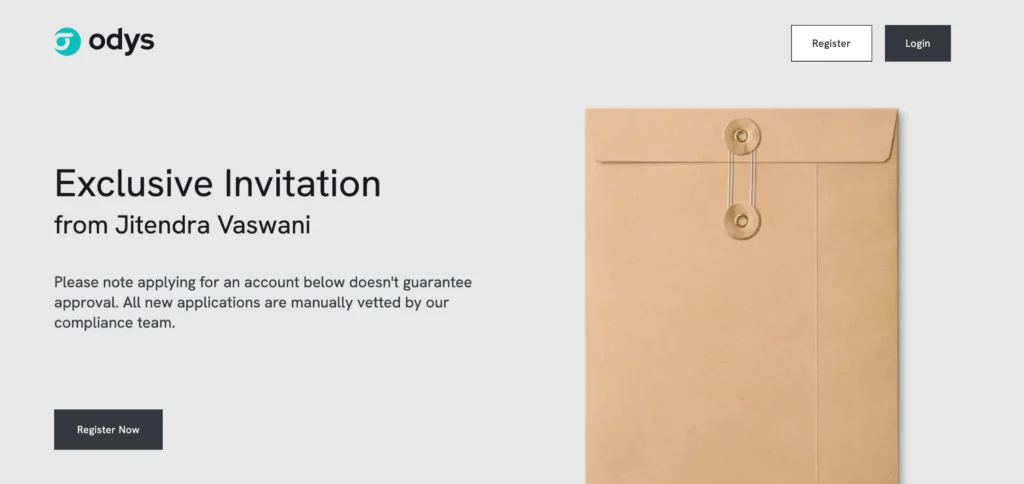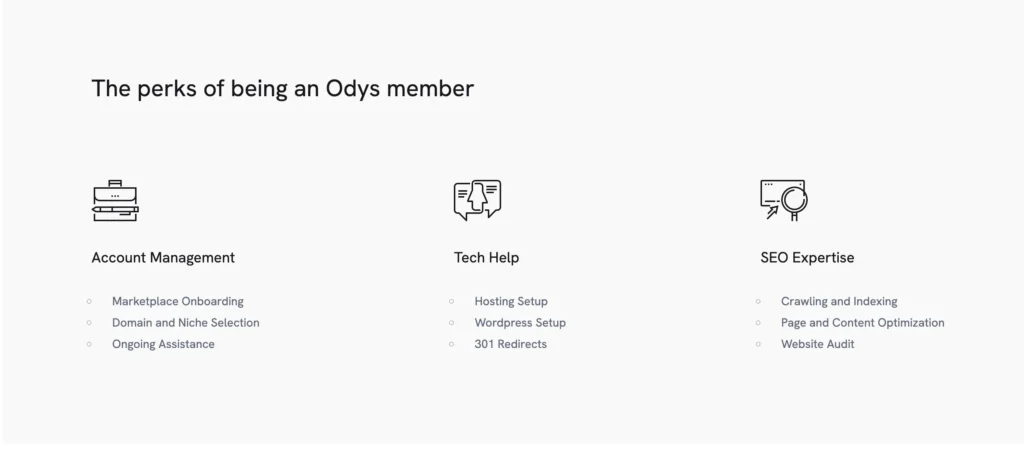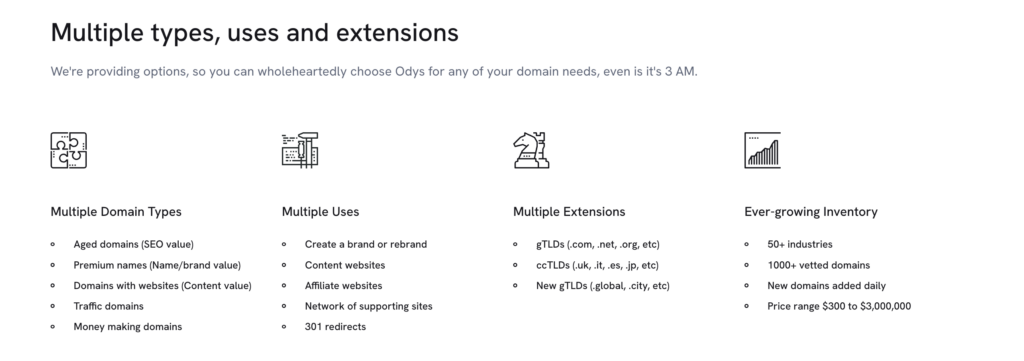
Odys Global is a reliable and innovative platform that offers effective solutions for business growth and digital marketing. It provides user-friendly tools and excellent support, making it a strong choice for businesses looking to expand online.
- Easy to use platform
- Comprehensive marketing tools
- Strong customer support
- Helps boost online presence
- Suitable for small businesses
- Limited advanced customization
In this article, I will share my personal experience building a website on an Odys Global-aged domain.
Throughout this review, you will gain insight into my journey and learn about the process of creating a website on a premium, aged Odys domain.
We will begin by exploring the reasons why individuals, including myself, choose to purchase aged domains and how this decision can speed up website ranking.
Explore Odys Global’s benefits and learn about them here in this Odys Global review.
Odys Global Review 2026: What Is Odys Global?

Odys Global is a digital marketing and business growth platform designed to help businesses increase their online visibility and reach.
It offers a suite of tools and services focused on local SEO, reputation management, lead generation, and website development.
The platform is built to simplify marketing efforts for small to medium-sized businesses by providing easy-to-use solutions that improve search engine rankings, manage customer reviews, and attract more leads.
With Odys Global, businesses can streamline their marketing strategies and grow their presence across multiple online channels without needing extensive technical knowledge.
Key Features Of Odys Global:

1. Local SEO Management
Helps businesses improve their local search rankings to attract more nearby customers by optimizing listings on Google My Business and other local directories.
2. Reputation Management
Monitors and manages online reviews and customer feedback to build a positive brand reputation and respond promptly to customer concerns.
3. Lead Generation Tools
Provides tools to capture and nurture leads through targeted marketing campaigns, helping businesses grow their customer base.
4. Website Development and Optimization
Offers easy-to-use website-building and optimization features designed to create mobile-friendly, fast-loading, and SEO-optimized websites.
5. Automated Marketing Campaigns
Enables businesses to run automated email and SMS campaigns to engage customers and drive repeat business.
6. Analytics and Reporting
Provides detailed reports and insights into marketing performance, website traffic, and customer engagement to help businesses make informed decisions.
7. Multi-Channel Management
Allows businesses to manage their presence across multiple platforms, including social media, review sites, and directories from one dashboard.
What Makes Google Trust a Website?
1. Age Matters:
When it comes to websites, age is like wisdom. Google likes older websites because they’ve been around longer and usually offer good stuff to people.
Imagine it’s like choosing between hiring a new worker or one with lots of experience. The one with experience usually gets more trust.
For instance, if I’m thinking of buying a website, I’d rather go for one that’s been around for 10 years and has a good reputation.
It’s like picking a sturdy, old tree over a sapling for climbing—it’s safer. In fact, platforms like Odys.global offer aged domains that you can use to build your website with a head start in trust.
2. Links Are Like Recommendations:
Google also looks at how many other websites are connected to your site.
It’s like when your friends recommend a restaurant to you because they trust it. If more websites trust your site and link to it, Google thinks, “Hey, this website must be great!”
But it’s not just about the number of links; it’s about the quality and relevance. It’s like saying having a lot of friends is cool, but it’s even better if they’re friends who share your interests. So, links from websites in the same category as yours are super valuable.
For example, if I’m running a cooking website, a link from a famous chef’s website is gold. But if some random website links to mine, Google might think it’s not as trustworthy.
Platforms like Odys.global can help you find these high-quality, niche-specific domains to link to your site.
3. Content Is King:
Google loves good content. It’s like being in a library where Google is the librarian, and it wants to recommend the best books to readers. So, if your website has awesome articles that people enjoy reading, Google likes you more.
Imagine you’re writing a school essay. If it’s well-researched and well-written, and your teacher sees others enjoying it, you’ll get an A+.
That’s what Google wants, too. Odys.global can assist you in finding aged domains with quality content that you can use as a foundation for your website.
4. Check Your Sources:
Lastly, Google wants to make sure your website doesn’t spread fake stuff. It checks where your information comes from. If you’re linking to reliable sources and your authors are experts in their field, Google smiles and says, “This website is trustworthy.”
It’s like when you’re in a debate, and you can back up your arguments with facts from trusted books and experts. You sound more convincing.
Using aged domains from platforms like Odys.global can give your website an edge in this department, too, as they often come with established authority and trusted sources.
Risks Of Building On An Aged Domain:
While aged domains offer many benefits, there are risks to consider:
1. Choosing the Wrong Domain:
If you pick a domain that had low or declining traffic before, bad backlinks, or was penalized by search engines, you’re essentially trying to revive a site that didn’t work well before. It might not work now, either.
Example: Imagine buying a car that has always had engine problems. Fixing it won’t guarantee it runs smoothly.
2. Copyright Issues:
Some domains may have copyrights or trademarks. If you buy one without proper permission, you could lose it. For instance, buying a domain like Google.com without Google’s consent would lead to legal troubles.
Example: You can’t just take someone else’s name or brand and use it as your own.
3. Changing the Domain’s Direction:
It’s crucial to keep the new site in the same niche and with the same intent as the old one. Trying to change its focus drastically can confuse both users and search engines, risking your rankings.
Example: If a restaurant suddenly starts selling car parts, customers will be puzzled.
4. Mismatched Content:
You should create content that matches the intent of the old site. Changing the content’s topic or purpose can signal to Google that your site is no longer the trusted one it used to be.
Example: Imagine a gardening website suddenly posting articles about video games. It confuses visitors and search engines alike.
Remember that, like any online venture, there are always uncertainties. Websites can lose traffic or face issues at any time, so it’s essential to choose your aged domain carefully and maintain its original purpose for the best results.
My Process for Buying an Aged Domain
My first time buying an aged domain
I’ll be honest: I didn’t have much experience with buying old website domains before this. Usually, I either got websites that were already making money or I started new ones with fresh web addresses.

But about six months ago, I got curious about something. I heard that using an old domain could help a new website rank better on Google without needing to do a lot of tricky stuff like getting other websites to link to it.
The idea of taking an old domain with a good history and making it popular again by adding new stuff sounded interesting.
So, I started looking into it. I heard a lot about a company called Odys Global, which deals with these old domains. I found out about them through emails about SEO (search engine optimization), which I’m into.
Odys seemed like a good place to start, but I was a bit scared because I had to spend a fair amount of money on a domain that didn’t have any visitors.
It took me a couple of days to get the courage to buy my first old domain from Odys. Looking back, I’m really happy I did. Odys is great because they pick out high-quality old domains with good reputations, and they keep them active while they’re up for sale.
It’s better to get an old domain that hasn’t been offline for a long time. I also liked that Odys checks to make sure these domains have good links to other websites, which saved me a bunch of time researching.
I also tried buying an old domain on my own once. Let me tell you, it was a lot of work and not as easy as using Odys. I had to search for usable domains for days using a tool called SEMRush.
Then, I had to wait for more than a month for the domain to become available. After that, I had to go to an auction to buy it.
So, using Odys was a smoother experience for me. They have a more straightforward process compared to the other way I tried.
How Do You Set Up An Aged Domain Website?
Here are the steps of how to revive an aged domain while avoiding copyright issues and maintaining its link authority:
Step 1: Identify High-Link Pages
First, identify the pages on the aged domain that have a significant number of valuable links. These are the pages you want to recreate on your new site.
Example: Imagine you’re reviving an old gardening website, and one of its pages about “Rose Care” has many high-quality links from other gardening websites.
Step 2: Recreate and Redirect
Recreate these high-link pages on your new site. However, please don’t copy them word-for-word.
Instead, conduct keyword research to come up with new URLs that have a better chance of ranking. Then, use 301 redirects to guide the traffic from the old page to the new one.
Example: You create a new page on your site called “Best Practices for Growing Roses.” You make sure it’s optimized for relevant keywords. Then, you 301-redirect the old “Rose Care” page to this new page.
Step 3: Content Creation
Now, it’s time to create fresh, high-quality content around the same topic.
This is crucial to avoid any copyright issues. Think about what the old site would have done and create content in line with that vision.
Example: The old site had a “Top 10 Roses for Beginners” page. You create a new, updated version with the latest rose varieties and care tips.
Step 4: Keyword Research
Use keyword research to identify the keywords your site used to rank for or keywords in the same niche. This ensures that your new content aligns with the old site’s intent and has a better chance of ranking well.
Example: If the old site ranked for “Rose Pruning Tips,” make sure your new content targets this keyword or related terms.
Step 5: Avoid Copyright Issues
Remember not to copy old content word-for-word. Create new content that covers the same topic or subject matter. This helps you avoid potential copyright problems.
Example: You find an old article about “Organic Pest Control for Roses.” Instead of copying it, you create a fresh article on the same topic, using updated information and your own writing style.
Step 6: Seek Inspiration from the Wayback Machine
The Wayback Machine is a valuable tool that allows you to see archived versions of old web pages. It can inspire your new content by showing you what the old site looked like and what its pages contained.
Example: You visit the Wayback Machine and explore the old “Rose Care” page.
You use this as inspiration to create a page on your site with similar content, but updated and improved.
Step 7: Maintain the Site’s Intent
Keep the intent of the site as much as possible. Google trusts the old site’s intent, so if you drastically change the site’s focus or angle, you may lose that trust.
Example: If the old site was all about roses, continue to focus on roses and related topics. Don’t suddenly switch to a completely different niche, like car repair.
By following these steps, you can effectively revive an aged domain, leverage its link authority, and avoid copyright issues while maintaining Google’s trust in the site’s intent and niche.
Odys Global: Pros and Cons
Pros
- Easy platform for managing local SEO and reviews
- Helps improve online visibility across multiple channels
- Automates marketing campaigns via email and SMS
- Provides detailed analytics for better business decisions
- User-friendly website builder with SEO optimization features
- Good customer support with helpful resources available
Cons
- Some advanced features require higher subscription plans
- Limited customization options for experienced marketers
Quick Links:
- Digital Ocean Alternatives
- How To Start Ecommerce Business In India
- Best Marketplaces To Buy Expired Domains
- KnownHost Review: Is it the Best Fully Managed VPS?
Conclusion: Odys Global Review 2026
In my view, if you want a really good old website address and don’t want the headache of sifting through lots of bad ones at auctions, Odys is a good choice!
What makes Odys special is that they carefully pick and check their old website addresses with real experts. This means when you get a website from them, you know it won’t have bad links or a sketchy history.
Yes, their good website addresses can be quite expensive, sometimes costing thousands of dollars.
But if you see it as an investment and have a good plan for how you’ll use that old website address, you could make a lot of money relatively quickly.



